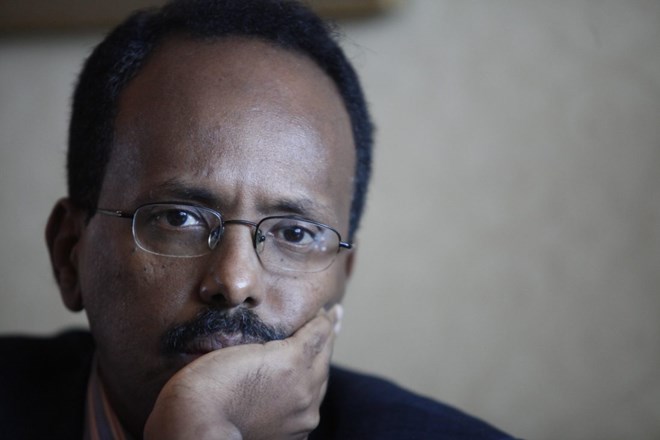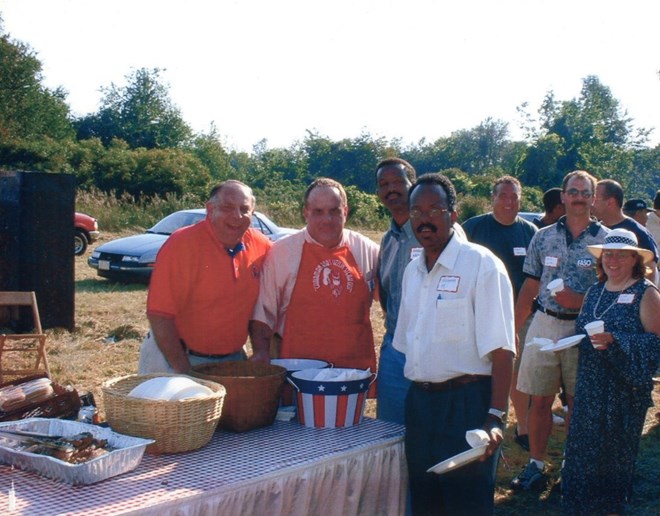
Tuesday February 21, 2017
By Jane Kwiatkowski Radlich

Somalia President-elect Mohamed A. Mohamed, who owns a house on Grand Island, will be inaugurated Wednesday in Somalia. This is a file photo of Mohamed being interviewed in a Buffalo hotel room on March 13, 2011. (Harry Scull Jr./Buffalo News)
Somalia President-elect Mohamed Abdullahi Mohamed quietly lived the American dream with his wife and four children on Grand Island. He provided his family with a comfortable lifestyle and put himself and his children through college.
A charismatic and humble man, he befriended fellow immigrants, political figures, sports celebrities. Former Buffalo Sabre Rick Martin liked to call him "Mohamed Squared."
He could have forgotten about the war-torn country in Africa where he was raised. Yet from the moment that Mohamed arrived in the U.S. in 1985, it became clear that his goal was to help rebuild Somalia.
And after Somalia's Parliament picked Mohamed on Feb. 8 to be the country's next president, people who know Mohamed from the Buffalo area said that if anyone can save Somalia, it's him.
"I don’t think they have seen the likes of someone like him in Somalia in decades," said Makau Mutua, former dean of the University at Buffalo School of Law who was born in Kenya. "Generally political candidates are full of ego and are self-serving.”
But most people regard Mohamed as "a man of virtue," Mutua said.
Wednesday, Mohamed is scheduled to be inaugurated as president of a country that's halfway across the world from the four-bedroom house assessed at $270,000 that he and his wife own on a cul-de-sac on Grand Island.
In 1993, Mohamed earned a bachelor's degree in history from UB. In 2009 he received his master's degree in American studies. His thesis was entitled "U.S. Strategic Interest in Somalia: From the Cold War Era to the War on Terror."
As a volunteer, he immersed himself in Erie County politics, attending fundraising picnics in the summer and getting out the vote in fall. Election season would find Mohamed and his recruits out on the streets working on campaigns – no matter how hard it rained.
Mohamed was a Republican who was skilled at networking. Friends called him a people person. He was active in the local Somali community and secured many jobs for acquaintances.
Early in 2010, Mohamed's life changed forever when friends arranged a meeting at the United Nations between him and Somali President Sheikh Sharif Sheikh Ahmed. The brief encounter placed him in the running as Somali prime minister, a position he later secured.
"I was taken aback," said UB Professor Donald Grinde, Mohamed's thesis adviser. "He was a happy guy with a family and a good job. He never mentioned that to me about going back. I thought if he did go back, he'd be a consultant. I never thought of him becoming a leader."
During his eight months as prime minister, Mohamed hit the ground running. He denounced corruption, reduced the size of the Cabinet and started to pay soldiers. In the end, an admittedly naïve Mohamed fell victim to clan politics, resigned from office and returned to Buffalo.
But the seed was planted.
This year, after almost a year of campaigning in his bomb-riddled country – about the size of Texas – Mohamed faced off in the presidential election against 19 opponents – and won.
In the final salvo, he won a run-off against incumbent President Hassan Sheikh Mohamud, who then peacefully conceded the election.
"It was a graceful transfer of power, unheard-of in Somalia," said Mutua.
Mohamed will have 10 to 12 million constituents. Officials estimate another 8.5 million Somalis have fled and are living in surrounding countries. Ethiopia has 5 million, Kenya 3 million and Djibouti 500,000.
They call him 'Cheese'
Italian colonization during the late 19th and 20th centuries introduced tomato sauce, pasta and cheese to the seaside country of Somalia. The onset of Italian restaurants followed, much to the enjoyment of Mohamed and his father, said Intisar Mohamed, Mohamed's 24-year-old daughter, who talked of a nickname her father inherited from his father.
"People call him 'Formaajo,' short for 'formaggio' which is Italian for cheese," she said.
Apparently Mohamed has adapted to his nickname. The official personal Twitter account of the ninth president of the Federal Republic of Somalia has the handle @M_Farmaajo.
His nickname may explain the choice of restaurant for one of Mohamed's going-away parties in 2010 when he was appointed prime minister, said Angelo "Andy" Sedita, Erie County commissioner of parks, recreation and forestry from 2005 to 2008.
"We had the party at Casa di Pizza on Elmwood," Sedita said. "He was fun to be around, a wonderful guy. He was always looking to get people jobs, always looking out for people."
Also attending the dinner was a posse of politicians including former County Executive Joel Giambra and top Giambra adviser Bruce Fisher. The mood was upbeat, Sedita recalled, though Mohamed really did not know what to expect from his volatile homeland.
About a year ago, before Mohamed left to campaign for president in Somalia, the two friends met at Judy's Deli in Waterfront Village.
"He was very serious," Sedita said. "He told me he was going back to Somalia to run for president. He knew it was risky, an uphill battle followed by a lot of challenges. But he was determined to do some good for his country.
"'I need to do this for the good of my people,'" he told me. 'It's got to get better – too much trouble,' he told me. I wished him luck and that was it," Sedita said. "Now I think about what he did.”

Mohamed A. Mohamed, center, photographed at an Erie County Republican Committee picnic in 2004 with, from left, Angelo Sedita, Michael Catalano and Mohamed's brother, Moallim Mohamed.
More politics
Mohamed's work as first secretary in the Somali Embassy in Washington may have been his baptism into American politics.
"He began to see how things work when he was at the embassy," Grinde said. "These are not abstract things in his life. He observed them at work, but working with me he saw them in an academic context. He understood it."
During his time at the embassy from 1985-88, there was increasing instability in Somalia that led to the government's collapse in 1991. Mohamed requested and was granted political asylum. Mohamed now has dual Somali and American citizenship.
In Buffalo, Mohamed's employment history was politically driven. He served as a commissioner for the Buffalo Municipal Housing Authority. In 2000, he took a position as minority business coordinator with the county's Division of Equal Employment Opportunity under Giambra.
Since 2002, Mohamed worked for the state Department of Transportation in Buffalo dealing with affirmative action issues and contract compliance. His rate of pay was $87,351 for 2016, but he received only $1,749 that year, according to seethroughny.com. Several calls to NYSDOT's state and regional offices seeking Mohamed's current employment status were not returned.
Somebody's got to do it
Transparency International, a global coalition that rates corruption by country, ranked Somalia as one of the most corrupt nations on earth.
Pre-election published reports from Somalia described millions of dollars changing hands in the weeks before Parliament's early February election, which was moved from the police academy to Mogadishu Airport due to the need for increased security.
It's also one of the most dangerous countries.
"Somalia has a terrible, terrible stretch over the past three decades – government collapse and civil unrest," said Mutua. "The country suffered various insurgencies, most of them from political Islam. Al-Shabab, I'd say, is quite successful. It has taken a toll on the country."
On Thursday, Mohamed received the keys to the presidential palace in Mogadishu, a ceremonial "handover." As the ceremony wound down, explosions were heard near the palace, startling some of the audience members, according to an Associated Press report. Two people were reported killed during the mortar attack in a residential area of the capital. The attack, by al Qaida-backed al-Shabab, was the first in Mogadishu since the election.
Over the weekend, Somalia's new president visited victims wounded by a car bomb in Mogadishu that on Sunday killed 34 people.
"Somalis are tired and fatigued of this conflict, and they just want to go on with their lives," said Mutua. "The government in Mogadishu has a tenuous hold on authority, territory and security. Most countries have moved their embassies out of Mogadishu and into Nairobi."
Grinde, of UB, recalls talking with Mohamed about the bulletproof windows installed in the presidential mansion.
"Some of the warlords and al-Shabab don't like him, and part of their way of dealing with that is to shoot him, but he knows that, too," said Grinde. "He has lots of armed guards."
On Friday, Mohamed retweeted a photo of himself posing in Somalia with the U.S. Ambassador to Somalia, who also happens to be from the Buffalo area. Stephen M. Schwartz, a career diplomat who attended Williamsville South High School, has been the ambassador to Somalia since June. He was appointed by President Obama.
In the photo, the two men are holding a baseball cap with this slogan printed on it: "Make Somalia Great Again.”
Somalia is one of the seven countries from which Schwartz's new boss, President Trump, banned all travel in a controversial executive order issued earlier this month that has since been rejected by a federal appeals court.
An idea man
Perhaps one of the best ideas that crossed Mohamed's mind in Buffalo was one that never got off the drawing board, said John Slisz, coordinator of corporate training and workforce development at Erie Community College.
Slisz met Mohamed through the state DOT to develop a training program for project managers. Afterward, Mohamed asked Erie Community College to hire him as a trainer on a different project – one closer to his heart.
Mohamed's "Somalia Turnaround Project" would train local Somali immigrants in construction trade skills, Slisz said.
"He had returned from Somalia and saw that the country needed infrastructure but lacked skilled building workers. We would train people here and maybe a population would return to Somalia," said Slisz.
"Over the course of six months – from late 2014 through mid-2015 – we put together a program that is still waiting for funding. He tried his best to secure funding, but the project sits on a shelf.
"I can see why people there love him," said Slisz. "He really wanted to do something for them and the country. He talked glowingly of his country and how it was changed because of terrorism. It has the climate of San Diego, he said. We talked about getting our passports and going there. Who knows, if the program gets wheels?"
Now, as president, Mohamed might be able to revive that idea.